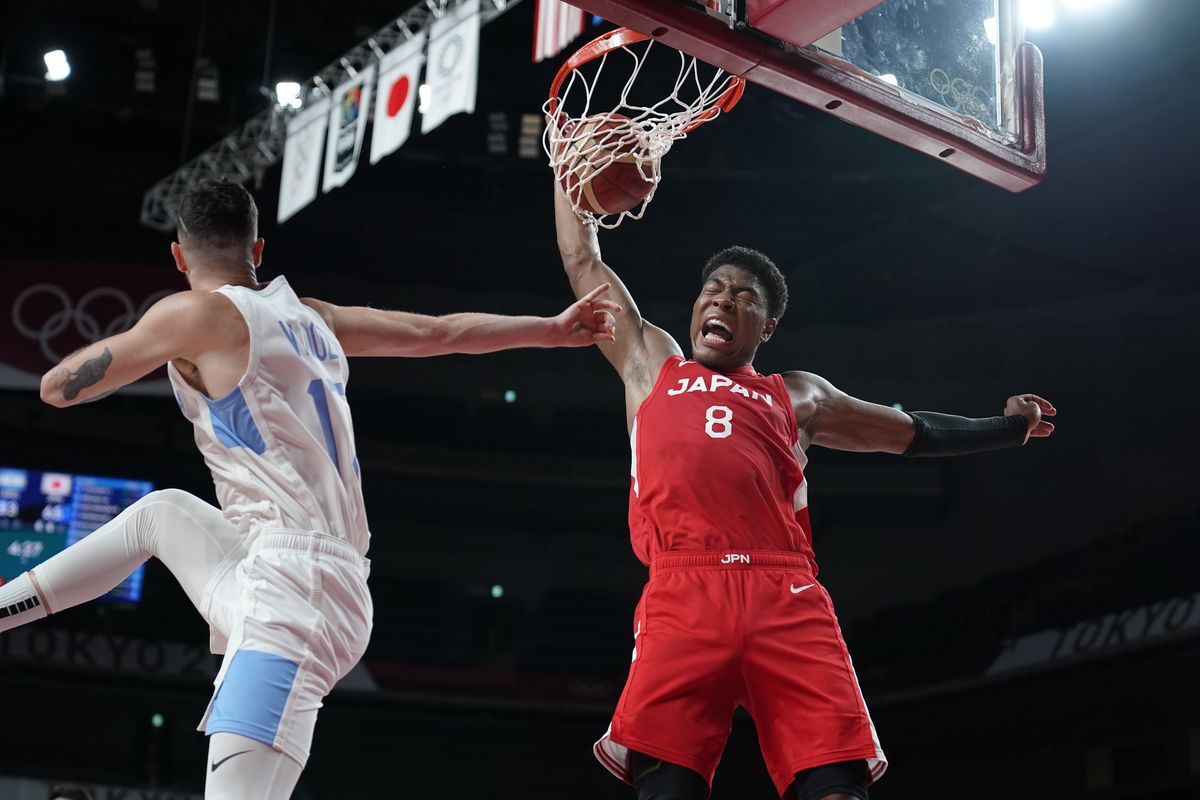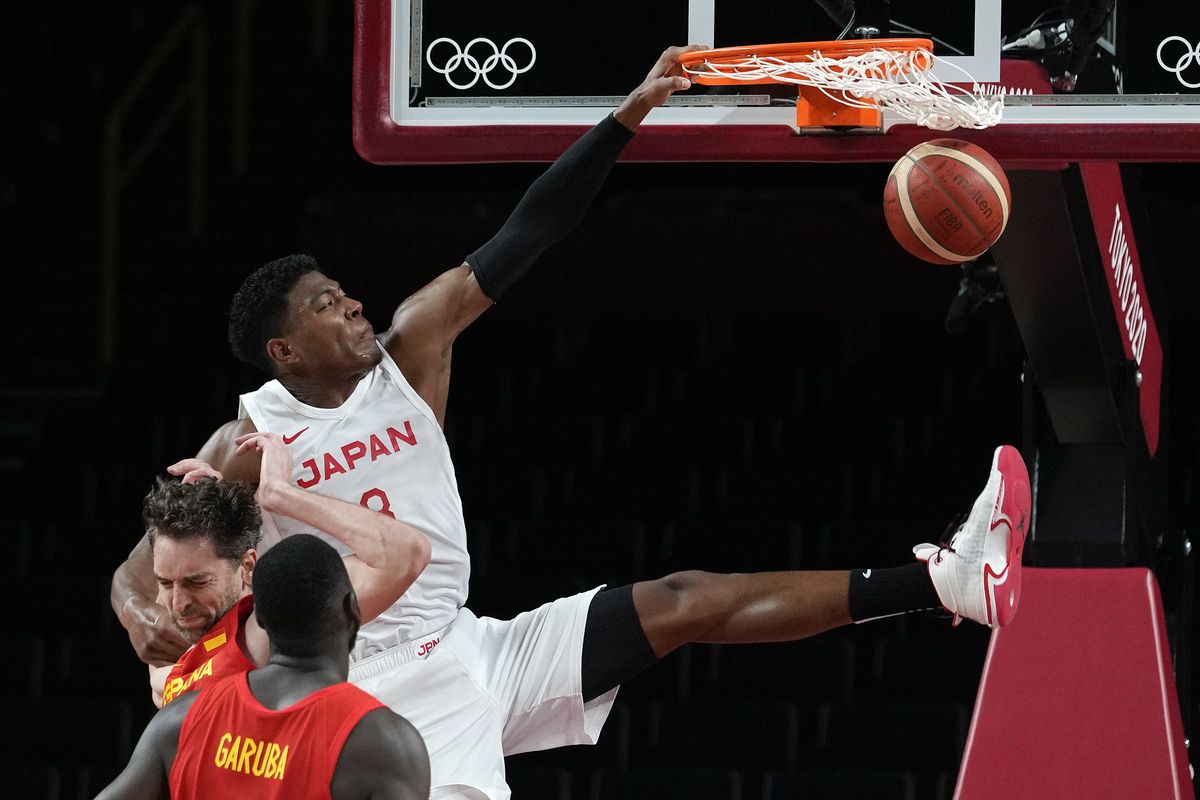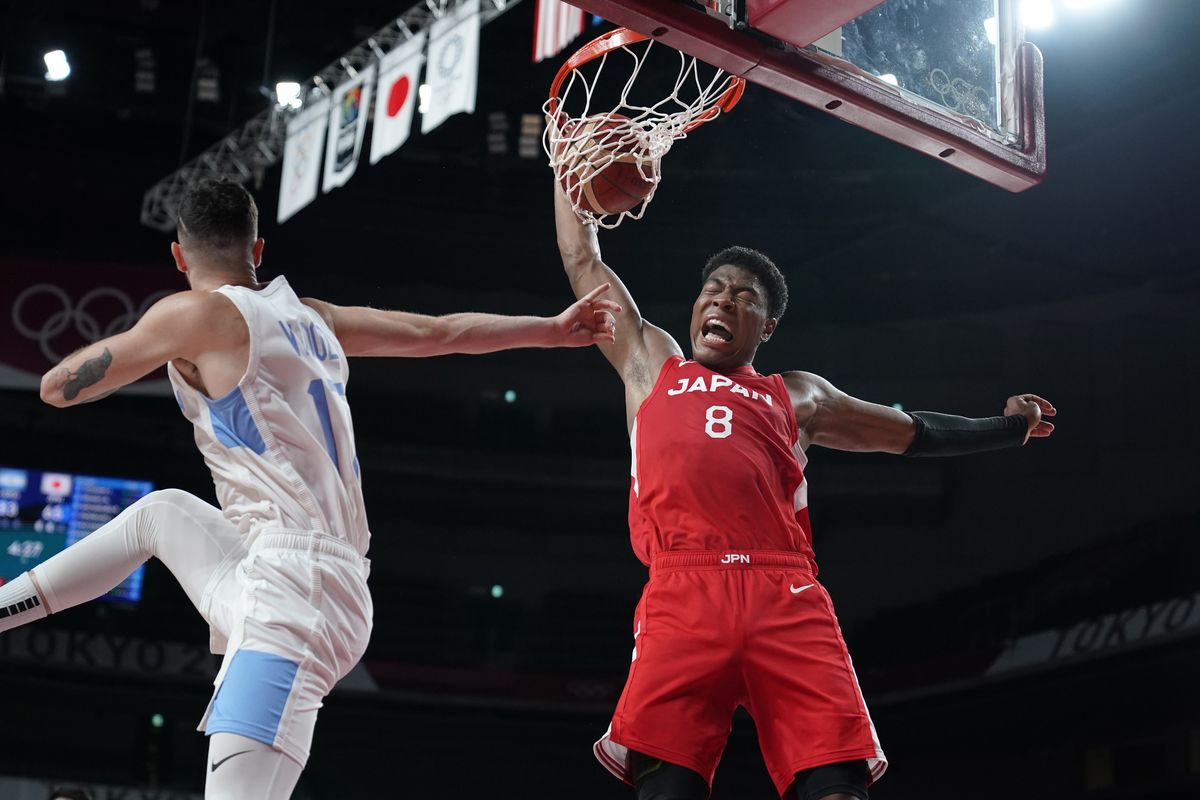Rui rules: Former Zag star Hachimura stirs Japan at Olympics
Japan’s Rui Hachimura (8) dunks over Argentina’s Luca Vildoza (17) during men’s basketball preliminary round game at the 2020 Summer Olympics, Sunday, Aug. 1, 2021, in Saitama, Japan. (Associated Press)
TOKYO – Rui Hachimura’s Olympic experience didn’t include a storybook appearance in a game with a coveted medal at stake .
But he did generate gold-medal level excitement for Japan’s sports fans, most of whom had never seen the national men’s basketball team appear in the Olympics before.
The Tokyo Games, pushed back a year due to the global pandemic, gave the Japanese team a chance to play on the world’s biggest stage for the first time since the 1976 Montreal Olympics, more than 20 years before Hachimura’s birth and decades before his rise to stardom at Sendai’s Meisei High School and Gonzaga University.
For Hachimura, a forward for the NBA’s Washington Wizards, the Olympic experience included an honor of a lifetime, he said. Hachimura, 23, was selected along with women’s freestyle wrestler Yui Susaki as one of Japan’s two flagbearers for the Opening Ceremony on July 23 at the New National Stadium.
Hachimura spoke about what it meant to him to be chosen as a flagbearer in the days leading up to the opening.
“I am very honored and very happy to be selected on the Japanese team for the Tokyo Olympics. I’m really looking forward to playing on the stage I dreamed of,” Hachimura was quoted saying by Kyodo News, a national news agency. “I would like to put the weight of the Hinomaru (flag) on my shoulders with my teammates, coaches, and staff, and work hard as a team to play in a way that makes all of Japan proud.”
——
On the court, he carried his team, as well. Despite Japan dropping three provisional games at the Olympics, Hachimura demonstrated his growth as a player since leaving the Zags as a first-round pick (No. 9 overall) after his junior season.
In an 88-77 loss to reigning world champion Spain in its first game, Hachimura scored 20 points, matching Spain’s savvy point guard and longtime NBA veteran Ricky Rubio for game-high total in points.
In normal times against a global basketball power like Spain, the sight of Hachimura, fellow NBA player Yuta Watanabe and the national team would have attracted a sellout crowd. But fans were barred at nearly all Olympic venues due to COVID-19 protocols amidst the pandemic.
As a result, Hachimura reflected on the what-ifs in comments to reporters after the game. He provided some perspective, looking back at exhibition contests from 2019 in the run-up to the FIBA World Cup.
“We talked about it before the game,” Hachimura said. “We actually played here like two years ago, an exhibition game or something. A lot of people came, we were looking forward to it, but it is what it is. Can’t do anything about it, and everybody’s watching on TV.”
In brief talks with several Japanese media colleagues and the nation’s basketball fans, there was a general consensus about what they witnessed in the Japan-Spain matchup: Mostly, how cool it was to see Hachimura and his teammates on the global stage.
For Hachimura, the showdown with Spain and Japan’s other Olympic games carried a special meaning – a chance to return to his homeland to play the sport he loves.
“I was truly excited about playing in Japan,” Hachimura said. “Even though there were no spectators, we were very happy to play in our country and hoping to do the same again.”
There was a definite buzz about that game that resonated with basketball fans of all ages in the Olympic host nation. And it carried over into the next game.
Although Slovenia pounded Japan 116-81 three days later, it was a game that elevated Hachimura even more. He led all scorers with 34 points on 13-for-28 shooting, including 3 of 6 on 3-pointers, and grabbed seven rebounds.
Hachimura’s heroics weren’t enough against a loaded Slovenian team featuring NBA superstar Luka Doncic (25 points, seven rebounds and seven assists), but his efforts generated big headlines throughout Japan on TV news programs, on websites, on social media posts and in newspapers the next morning.
After all, he had outscored Doncic, who dropped 48 in his Olympic debut against Argentina days earlier.
“They’re not just about Doncic,” Hachimura said after the game. “We knew they have players who can play other than Doncic and that’s where we focused on. But we were overmatched as a team. We started off well but at the end of the day, their strength overpowered ours.”
A fierce competitor, Hachimura couldn’t conceal his disappointment after the loss.
“Whether it’s on defense or offense, I play to win,” Hachimura said. “It doesn’t matter how many I score or don’t score. And seeing that we lost again, I don’t think I did enough.”
In its final game, Japan fell to Argentina 97-77. Hachimura finished with 13 points and 11 rebounds.
While disappointed with the finale, Hachimura knew that Japan had taken its first steps toward establishing itself as a legitimate competitor.
“I believe we still have a long way to go as a team. And I know there is still a huge gap between us and the world’s top teams,” Hachimura said.
“But I believe we are gaining on them little by little. I hope (we) don’t forget that fact and keep striving as a team.”
To evolve and rise in the global rankings, Hachimura said Japan must learn from its trio of Olympic defeats and continue to develop the national team, individually and collectively.
“The result is disappointing, but I believe we’ll learn from this experience and become a stronger team,” he said. “This is only our second time to play at an international competition, and I think we were better than we were at the World Cup.
“We will work harder toward the next World Cup and the Olympics.”
Ed Odeven, based in Tokyo, is the sports editor of japan-forward.com. He is a former reporter for the Japan Times.


